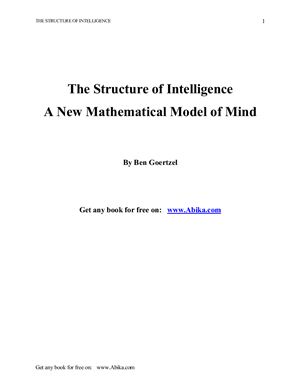Springer-Verlag, 1993, 160 pages.
Contents:
Introduction.
Psychology versus Complex Systems Science.
Mind and Computation.
Synopsis.
Mathematics, Philosophy, Science.
Mind and computation.
Rules.
Stochastic and Quantum Computation.
Computational Complexity.
Network, Program or Network of Programs?
Optimization.
Thought as Optimization.
Monte Carlo and Multistart.
Simulated Annealing.
Multilevel Optimization.
Quantifying structure.
Algorithmic Complexity.
Randomness.
Patte.
Meaningful Complexity.
Structural Complexity.
Intelligence and mind.
The Triarchic Theory of Intelligence.
Intelligence as Flexible Optimization.
Unpredictability.
Intelligence as Flexible Optimization, Revisited.
Mind and Behavior.
Induction.
Justifying Induction.
The Tendency to Take Habits.
Toward General Induction Algorithm.
Induction, Probability, and Intelligence.
Analogy.
The Structure-Mapping Theory of Analogy.
A Typology of Analogy.
Analogy and Induction.
Hierarchical Analogy.
Structural Analogy in the Brain.
Long-term memory.
Structurally Associative Memory.
Quillian Networks.
Implications of Structurally Associative Memory.
Image and Process.
Deduction.
Deduction and Analogy in Mathematics.
The Structure of Deduction.
Paraconsistency.
Deduction Cannot Stand Alone.
Perception.
The Perceptual Hierarchy.
Probability Theory.
The Maximum Entropy Principle.
The Logic of Perception.
Motor leaing.
Generating Motions.
Parameter Adaptation.
The Motor Control Hierarchy.
Neural-Darwinist Perceptual-Motor Hierarchy.
Consciousness and computation.
Toward a Quantum Theory of Consciousness.
Implications of the Quantum Theory of Consciousness.
Consciousness and Emotion.
The master network.
The Structure of Intelligence.
Design for a Thinking Machine.
Appendix 1: Components of the master network.
Appendix 2: Automata networks.
Appendix 3: A quick review of boolean logic.
Contents:
Introduction.
Psychology versus Complex Systems Science.
Mind and Computation.
Synopsis.
Mathematics, Philosophy, Science.
Mind and computation.
Rules.
Stochastic and Quantum Computation.
Computational Complexity.
Network, Program or Network of Programs?
Optimization.
Thought as Optimization.
Monte Carlo and Multistart.
Simulated Annealing.
Multilevel Optimization.
Quantifying structure.
Algorithmic Complexity.
Randomness.
Patte.
Meaningful Complexity.
Structural Complexity.
Intelligence and mind.
The Triarchic Theory of Intelligence.
Intelligence as Flexible Optimization.
Unpredictability.
Intelligence as Flexible Optimization, Revisited.
Mind and Behavior.
Induction.
Justifying Induction.
The Tendency to Take Habits.
Toward General Induction Algorithm.
Induction, Probability, and Intelligence.
Analogy.
The Structure-Mapping Theory of Analogy.
A Typology of Analogy.
Analogy and Induction.
Hierarchical Analogy.
Structural Analogy in the Brain.
Long-term memory.
Structurally Associative Memory.
Quillian Networks.
Implications of Structurally Associative Memory.
Image and Process.
Deduction.
Deduction and Analogy in Mathematics.
The Structure of Deduction.
Paraconsistency.
Deduction Cannot Stand Alone.
Perception.
The Perceptual Hierarchy.
Probability Theory.
The Maximum Entropy Principle.
The Logic of Perception.
Motor leaing.
Generating Motions.
Parameter Adaptation.
The Motor Control Hierarchy.
Neural-Darwinist Perceptual-Motor Hierarchy.
Consciousness and computation.
Toward a Quantum Theory of Consciousness.
Implications of the Quantum Theory of Consciousness.
Consciousness and Emotion.
The master network.
The Structure of Intelligence.
Design for a Thinking Machine.
Appendix 1: Components of the master network.
Appendix 2: Automata networks.
Appendix 3: A quick review of boolean logic.

